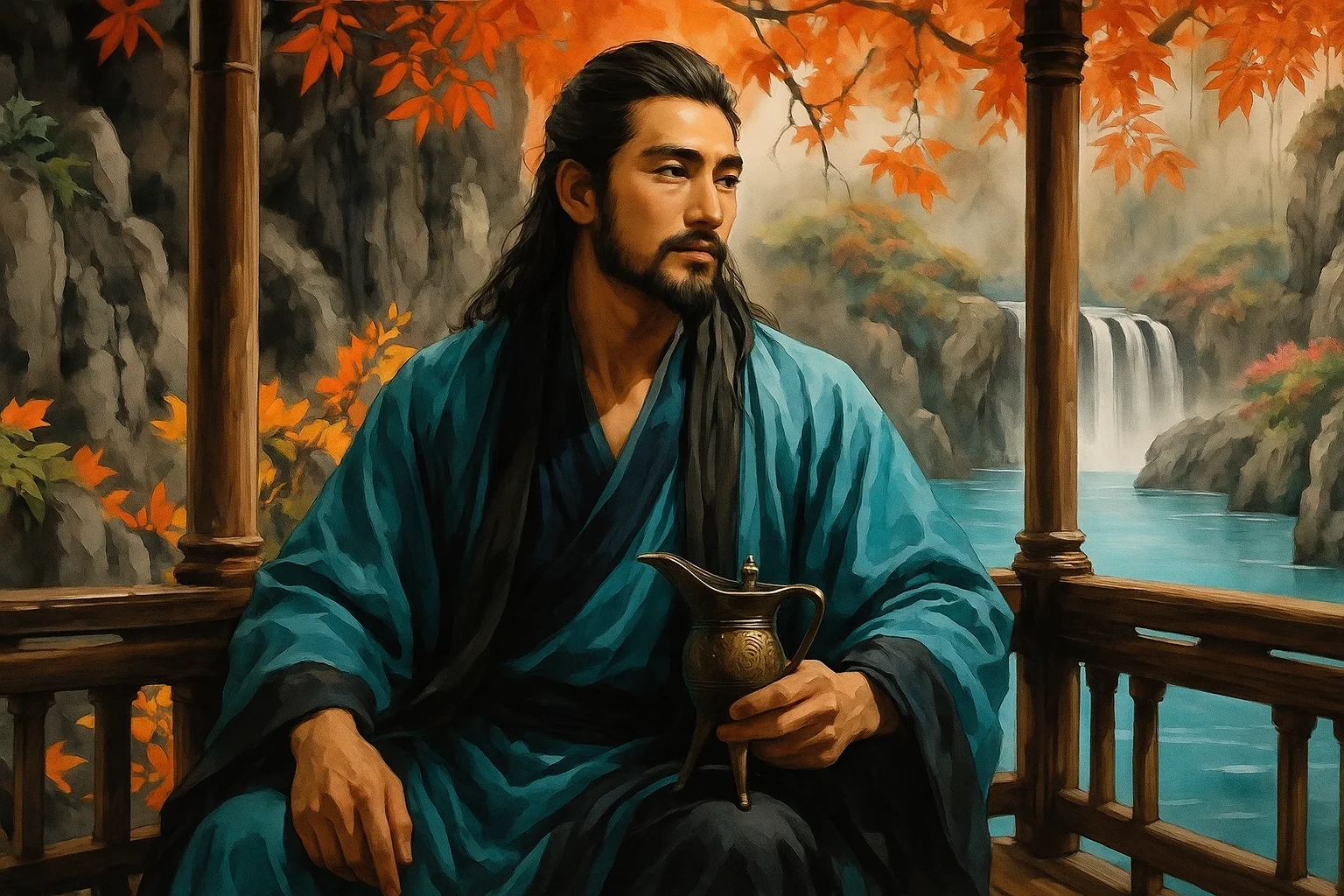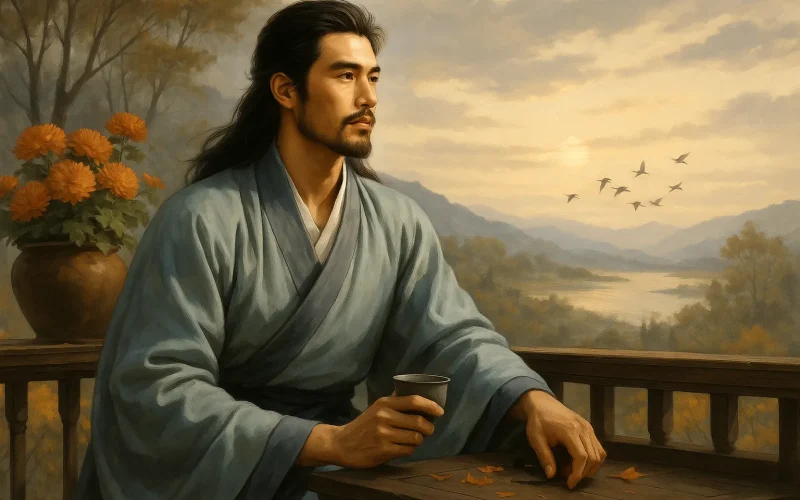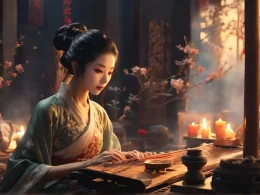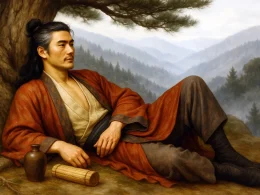Those days in Western Capital—what riotous cheer!
Since we parted, who could share such joy with me?
The Yi River’s hills, the Luo River’s flowers,
Now all seem but a dream when searched for.
Today we meet again, deeper our ties grow,
Yet my heart sinks to hear the painted tower’s bell.
White-haired, at earth’s end, faced with this scene,
I tilt the golden cup—but who will drink with me?
Original Poem
「夜行船 · 忆昔西都欢纵」
忆昔西都欢纵。
自别后、有谁能共。
伊川山水洛川花,细寻思、旧游如梦。今日相逢情愈重。
欧阳修
愁闻唱、画楼钟动。
白发天涯逢此景,倒金尊、殢谁相送。
Interpretation
Composed in 1048 when the 42-year-old Ouyang Xiu was transferred from Chuzhou to Yangzhou, this lyric captures his bittersweet reunion with Mei Yaochen, who was passing through on his way to a new post. Against the backdrop of deceased mutual friends from their Luoyang days, the work intertwines nostalgic recollection with poignant present-moment awareness, embodying midlife reflections on friendship's enduring bonds amidst life's impermanence.
First Stanza: "忆昔西都欢纵。自别后、有谁能共。伊川山水洛川花,细寻思、旧游如梦。"
Yì xī xī dōu huān zòng. Zì bié hòu, yǒu shuí néng gòng. Yī chuān shān shuǐ luò chuān huā, xì xún sī, jiù yóu rú mèng.
Remember our Luoyang revels—what shared ecstasy!
Since parting, who could match such company?
The Yi River's hills, the Luo's flowered streams—
Examined closely now,
Those past excursions seem
A bright-drenched dream.
The stanza constructs a double exposure of memory and present reality. The initial exclamation ("what shared ecstasy!") bursts with undimmed joy, while the rhetorical question ("who could match…") underscores irreplaceable loss. The precise geographical details (伊川/洛川) anchor the dreamlike quality in tangible landscapes, making the final "bright-drenched dream" (旧游如梦) both vivid and ephemeral—like a watercolor left in the rain.
Second Stanza: "今日相逢情愈重。愁闻唱、画楼钟动。白发天涯逢此景,倒金尊。殢谁相送。"
Jīn rì xiāng féng qíng yù zhòng. Chóu wén chàng, huà lóu zhōng dòng. Bái fà tiān yá féng cǐ jǐng, dào jīn zūn. Tì shuí xiāng sòng.
Today's meeting makes our bond weigh heavier still—
A mournful song echoes, painted tower's bell tolls shrill.
White-haired at earth's edge, we face this view,
Upturning golden flasks,
Left wondering who
Will remain true
When next we part—
Who?
The present-moment encounter vibrates with layered tensions. The "painted tower's bell" (画楼钟动) functions as both temporal marker and memento mori, its chime slicing through conviviality. The physical gestures—"tilt gold cups" (倒金尊)—become ritualistic defenses against impending separation. The final whispered question ("Who'll be there?") transforms the conventional farewell into existential inquiry, laying bare the uncertainty that shadows all human connections.
Holistic Appreciation
This is a quintessential lyric poem of nostalgia and farewell. The first stanza reminisces about past travels in Luoyang, where old friends have mostly passed away, leaving behind only dreamlike memories that linger like echoes. The second stanza depicts a bittersweet reunion soon to end in parting—deepening affection makes the sorrow of separation harder to bear, and even shared wine cannot ease the pain. The poet masterfully blends scene and sentiment, naturally fusing the ache of remembrance, the sorrow of farewell, and lamentations over life’s impermanence. Contrasts like "carefree revelry" versus "white-haired wanderer," and "past joys like dreams" versus "today’s sorrowful reunion," create layers of melancholy across time and space. The closing line, "Who will stay to share this final cup?" carries boundless depth in its simplicity, leaving an enduring resonance.
Artistic Merits
The poem’s greatest strength lies in its profound yet restrained emotion, and its plainspoken yet powerfully expressive language. Structurally, it employs a progressive unfolding—"remembering the past, reflecting on the present"—to naturally convey the poet’s emotional journey. Artistically, it excels in contrasts: "Luoyang’s joyous abandon" against "white-haired exile," and "past travels like dreams" against "today’s reunion," heightening the poignant tension of time’s passage. External imagery—"the painted tower’s bell tolls," "overturned golden cups"—internalizes emotion, expressing sorrow without explicit declaration, embodying Ouyang Xiu’s signature style of "hiding deep pain in simple words."
Insights
This poem is not merely an ode to nostalgia but also a meditation on life’s meetings and partings. It reminds us that youth fades, friends depart, and nothing in life is constant—so we must cherish those before us while we can and hold fast to fleeting moments of connection. Ouyang Xiu, with his sparse words and quiet scenes, conveys the deepest of emotions, teaching us that true friendship lies not in frequent gatherings but in hearts that never truly drift apart. Like a cup of warm wine, this poem grows richer with each sip—warming yet bittersweet, a true reflection of the middle-aged soul.
About the Poet

Ouyang Xiu (欧阳修, 1007 - 1072), a native of Yongfeng, Jizhou (present-day Jiangxi Province), emerged as the preeminent literary figure of the Northern Song Dynasty. After attaining the jinshi degree in 1030, he spearheaded a literary reform movement that rejected the ornate Xikun style prevalent at court. As a mentor who nurtured literary giants like Su Shi and Zeng Gong, he laid the foundation for the golden age of Northern Song literature. Recognized as one of the "Eight Great Prose Masters of Tang and Song," Ouyang stands as the pivotal figure in the transformation of Northern Song literary culture.












